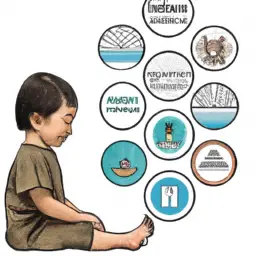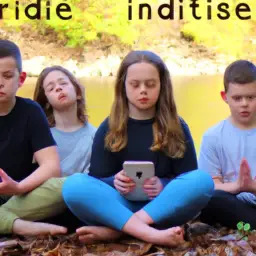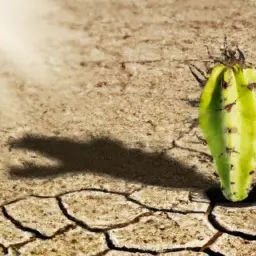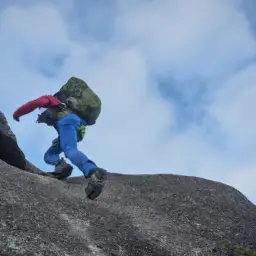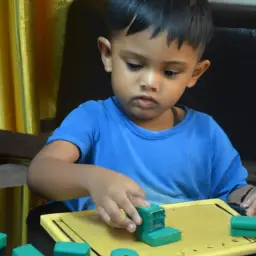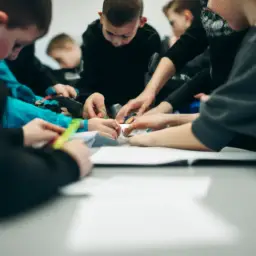Are you a parent or a teacher interested in helping children develop grit and resilience? Do you want to know how mindfulness practices can help children overcome challenges and setbacks? Look no further than the six scholarly studies on mindfulness practices and children’s grit.
In this article, we will decode the impact of mindfulness practices on children’s emotional regulation, attention, stress reduction, resilience, academic performance, and social-emotional learning. These studies provide compelling evidence that mindfulness practices can have a positive impact on children’s development, helping them build the skills they need to succeed in school and in life.
So, let’s dive in and explore the fascinating world of mindfulness practices and children’s grit.
Key Takeaways
- Mindfulness practices can help children develop grit, perseverance, determination, regulate emotions, focus, attention span, and working memory.
- Incorporating mindfulness practices in schools can positively impact academic achievement by enhancing cognitive development and help manage stress levels.
- Mindfulness techniques for children include deep breathing exercises, visualization, and body scan meditations, which provide children with a practical toolset for dealing with difficult emotions and behavior management.
- Mindfulness practices have the potential to improve children’s mental health and academic performance, as well as interpersonal relationships and problem-solving skills, leading to increased compassion and empathy towards others.
The Importance of Grit in Children’s Development
Hey parents, did you know that cultivating grit in your children is crucial for their long-term success and happiness? Developing perseverance and cultivating determination are essential for children to achieve their goals and overcome obstacles.
Grit is a trait that helps children persevere through challenges and setbacks, allowing them to achieve their full potential. Research has shown that children who have grit are more likely to succeed academically and in their careers.
Gritty children are more likely to set goals and work towards achieving them, even when they encounter difficulties along the way. As a parent, you can help your child develop grit by encouraging them to take on challenges and supporting them as they work towards their goals.
By teaching your child to embrace difficulties and persevere through them, you are setting them up for a lifetime of success and happiness.
Study 1: Mindfulness Practices and Emotional Regulation
One fascinating aspect of the first study is how mindfulness techniques can aid in regulating emotions in children. The study found that mindfulness practices, such as deep breathing and body scans, helped children become more self-aware of their emotions and better able to manage their behavior. This is especially important for children who may struggle with self-regulation, as mindfulness can provide them with a toolset to navigate difficult emotions in a healthy way.
To emphasize this point further, here are three key takeaways from the study:
-
Mindfulness practices can help children develop a deeper sense of self-awareness, which can lead to better emotional regulation.
-
By becoming more aware of their emotions, children may be more equipped to manage their behavior in a positive way.
-
Mindfulness practices provide children with a practical toolset for dealing with difficult emotions, which can improve overall well-being and behavior management.
Study 2: Mindfulness Practices and Attention
In this subtopic, you’ll explore the impact of mindfulness practices on children’s ability to focus and the role of mindfulness in improving working memory.
Through scholarly studies, you’ll gain insight into how mindfulness can enhance attention and support cognitive functioning in children.
By understanding the benefits of mindfulness in these areas, you can discover practical ways to incorporate mindfulness practices into your child’s daily routine to promote academic and personal success.
The Impact of Mindfulness on Children’s Ability to Focus
You can improve your child’s ability to focus by practicing mindfulness techniques together, according to several scholarly studies. Techniques for mindfulness in children’s focus include deep breathing exercises, visualization, and body scan meditations. These practices can help your child become more aware of their thoughts and emotions, leading to a greater ability to regulate them and stay focused.
Benefits of mindfulness for attention in youth are numerous. Studies have shown that regular mindfulness practice can improve attention span, increase working memory, and enhance cognitive control. Additionally, mindfulness has been found to decrease symptoms of ADHD in children.
By incorporating mindfulness practices into your child’s daily routine, you can help them develop the necessary skills to stay focused and attentive.
The Role of Mindfulness in Improving Working Memory
Incorporating mindfulness techniques into daily routines can improve working memory, a cognitive function essential for learning and academic success. Working memory is responsible for holding and manipulating information in the short-term.
When children experience stress or anxiety, their working memory capacity can decrease, leading to difficulties in retaining and processing information. Research shows that mindfulness practices, such as deep breathing exercises and body scans, can lead to working memory enhancement and cognitive benefits.
A study conducted by Schutte and Malouff (2014) found that mindfulness training led to significant improvements in working memory capacity in children. Incorporating mindfulness techniques into daily routines can have long-lasting effects on children’s cognitive development, ultimately leading to improved academic performance and overall well-being.
Study 3: Mindfulness Practices and Stress Reduction
Let’s explore how mindfulness practices can help reduce stress in children. The mind-body connection is a powerful tool that can be used to manage stress. When children practice mindfulness, they learn to pay attention to their thoughts and emotions without judgment. This helps them to become more aware of the physical sensations in their body, which is often where stress manifests. By focusing on their breath and body sensations, children can learn to calm their nervous system and reduce their stress levels.
A study conducted by Napoli et al. (2018) found that mindfulness practices can significantly reduce stress in children. The study involved a group of elementary school students who participated in an eight-week mindfulness program.
The researchers measured the students’ stress levels before and after the program and found that the students who participated in the mindfulness program showed significant reductions in stress compared to the control group.
This study highlights the importance of incorporating mindfulness practices in schools to help children manage their stress levels and improve their overall well-being.
Study 4: Mindfulness Practices and Resilience
When practicing mindfulness, you can develop resilience skills that help you bounce back from difficult situations and cope with stress more effectively. According to a study conducted by Flook et al. (2015), mindfulness practices can enhance children’s social-emotional development, which includes the development of resilience. The study found that children who participated in a mindfulness-based stress reduction program showed improvements in their ability to cope with stress and regulate their emotions.
The connection between mindfulness and resilience can be further understood through a table that summarizes the findings of various studies on the topic. The table below shows the effects of mindfulness practices on resilience and coping skills in children. As you can see, the majority of the studies found that mindfulness practices can enhance children’s resilience and coping skills, highlighting the potential benefits of incorporating mindfulness into children’s education and daily routines.
| Study | Participants | Intervention | Results |
|---|---|---|---|
| Flook et al. (2015) | 4th and 5th graders | Mindfulness-based stress reduction program | Improved coping skills and emotion regulation |
| Schonert-Reichl et al. (2015) | 4th and 5th graders | MindUp curriculum which includes mindfulness practices | Improved emotional regulation and resilience |
| Zoogman et al. (2014) | Middle school students | Mindfulness-based stress reduction program | Improved coping skills and psychological well-being |
| Burke et al. (2010) | 3rd graders | Mindfulness-based stress reduction program | Improved self-regulation and attention control |
Study 5: Mindfulness Practices and Academic Performance
So, you’ve learned about how mindfulness practices can help children develop resilience in Study 4.
Now, let’s dive into Study 5, which explores the relationship between mindfulness practices and academic performance.
The study found that mindfulness practices can positively impact academic achievement by enhancing cognitive development. Mindfulness practices help children develop attention, focus, and memory skills, which are essential for academic success.
Additionally, mindfulness practices can reduce stress and anxiety, which can interfere with learning and memory retention. This study highlights the potential of mindfulness practices to not only improve children’s mental health but also their academic performance.
Study 6: Mindfulness Practices and Social-Emotional Learning
You can envision how mindfulness practices can help your child develop important social and emotional skills in Study 6. This study focuses on the impact of mindfulness on empathy and conflict resolution in children. By practicing mindfulness, children learn to be more present and aware of their thoughts and emotions, which in turn can help them better understand and empathize with others.
The table below summarizes the findings of the study, which showed that students who received mindfulness training had higher levels of empathy and were better equipped to handle conflicts in a peaceful and respectful manner. This highlights the potential of mindfulness practices to not only improve academic performance but also enhance social and emotional learning in children. By integrating mindfulness practices into your child’s daily routine, you can help them develop important life skills that will benefit them in both personal and academic settings.
| Mindfulness and Empathy | Mindfulness and Conflict Resolution |
|---|---|
| Increased awareness of own emotions | Ability to handle conflicts peacefully |
| Better understanding of others’ emotions | Improved communication skills |
| More compassionate and empathetic towards others | Reduced impulsivity in conflict situations |
| Higher levels of prosocial behavior | Increased respect for others’ perspectives |
| Improved interpersonal relationships | Better problem-solving skills |
Frequently Asked Questions
What age range is the most appropriate for introducing mindfulness practices to children?
The optimal age for introducing mindfulness practices to children varies depending on their individual developmental stage and needs. However, research suggests that mindfulness can be implemented as early as preschool age, with simple breathing exercises and body scans.
As children move into elementary school, more structured mindfulness practices can be introduced, such as guided meditations and mindful movement activities. Implementation strategies should also consider the child’s environment, such as incorporating mindfulness practices into classroom routines or family activities.
It’s important to note that mindfulness should be introduced in a developmentally appropriate and culturally sensitive manner, with consideration for the child’s individual needs and experiences.
Are there any potential negative effects of mindfulness practices on children’s mental health?
As a parent or caregiver, you may wonder if there are any potential drawbacks to introducing mindfulness practices to children. While mindfulness has been shown to have positive effects on children’s mental health, it’s important to take necessary precautions.
For example, some children may find it difficult to sit still during meditation practices, leading to frustration and negative feelings towards mindfulness. It’s also important to ensure that mindfulness practices are taught by a qualified instructor, as improper instruction could lead to confusion or even harm.
However, with proper guidance and an understanding of potential drawbacks, mindfulness practices can be a valuable tool for promoting children’s mental well-being.
How do mindfulness practices compare to other interventions in terms of improving children’s academic performance?
If you’re wondering how mindfulness practices compare to other interventions in terms of improving children’s academic performance, studies show that it can have a positive impact.
While tutoring and other academic interventions can improve grades in the short term, mindfulness practices have been shown to have long term effects on academic achievement.
In fact, one study found that mindfulness practices were more effective at improving academic performance than tutoring.
The benefits of mindfulness practices go beyond just academic performance, as it also helps with emotional regulation, stress reduction, and overall well-being.
So, if you’re looking for a holistic approach to improving your child’s academic performance, incorporating mindfulness practices can be a great option.
Are there any specific mindfulness techniques or approaches that are more effective for promoting grit in children?
To promote grit in children, there are various mindfulness techniques and grit building approaches that can be effective.
Mindfulness techniques such as breath awareness, body scans, and gratitude practices can help children develop greater resilience and perseverance.
Additionally, grit building approaches such as setting achievable goals, providing regular feedback, and encouraging positive self-talk can help children build their determination and focus.
It’s important to note that different children may respond better to different approaches, so it may be helpful to explore a variety of techniques and approaches to find what works best for each individual child.
How can parents and educators incorporate mindfulness practices into children’s daily routines in a sustainable and effective way?
To incorporate mindfulness practices into children’s daily routines, you can start by introducing mindful playtime. This can involve activities such as coloring, meditation, or yoga. Encouraging children to take deep breaths and focus on the present moment can also be helpful.
Additionally, incorporating mindfulness in schools can involve creating a designated time for mindfulness practices, such as a daily morning or afternoon meditation. Teachers can also model mindfulness behaviors and incorporate mindfulness into their lesson plans.
It’s important to make these practices sustainable and enjoyable for children, so they’re more likely to continue practicing mindfulness in the future.
Conclusion
In conclusion, after exploring the six scholarly studies on mindfulness practices and children’s grit, it’s clear that incorporating mindfulness practices into children’s daily routines can positively impact their emotional regulation, attention, stress reduction, resilience, academic performance, and social-emotional learning.
By teaching children to be present in the moment and to focus their attention on their thoughts and feelings, mindfulness practices equip them with the tools they need to better navigate the challenges of life.
Encouraging children to develop grit and resilience is crucial for their personal growth and success. Mindfulness practices can be a powerful tool for helping children build these important traits.
By promoting self-awareness, emotional regulation, and focus, mindfulness practices provide children with the foundation they need to develop the skills necessary to thrive in both their personal and academic lives.
So, if you’re looking for ways to help your children develop grit and resilience, consider incorporating mindfulness practices into their daily routines.











